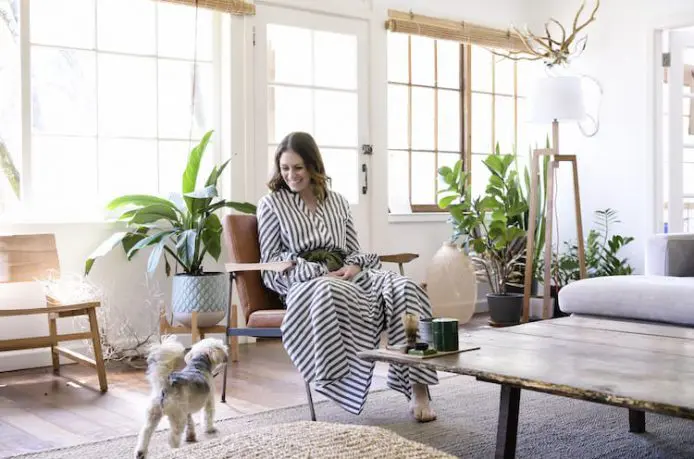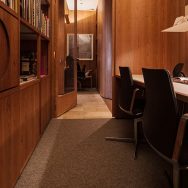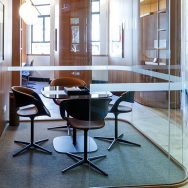Sometimes people can seem so freaking ‘balanced’ and successful that they become inaccessible, and their lives unattainable. Particularly in the realm of health and wellness, exemplar living (or at its worst, toxic positivity) can make us feel inadequate and unseen.
Meditation Master Jacqui Lewis is NOT such a person. She is just like us. She is ambitious but also has her moments of doubt, she is highly engaged but sometimes wants to retreat from the world, she is happy to slouch in linen pants but also loves the cut of a great suit. She honours her individuality and independence but also must participate in the world as a mother, wife, business owner and friend.
But unlike many of us, Jacqui has learned the technique, discipline and art form or meditating amongst the madness. To create a strong inner world to sustain her within a maddening outer one. And her passion is to pass on these tools equip others to live better via The Broad Place, which she founded with her husband Arran Russell.
The Broad Place is a global school sharing ancient knowledge and modern neuroscience, tools and experiences for higher grade living. At its heart is an integrated meditation practice based on the best of parts of ancient mantra-based techniques, adapted for a modern (read high-pressure) world.
We asked Jacqui about her school for ‘High Grade Living’ and how we might access greater clarity, creativity and consciousness through loosening the grip on our ‘lower’ selves.
Jacqui, there are literally hundreds of meditation techniques encompassing practices from different traditions, cultures, spiritual disciplines, and religions. The Broad Place is grounded in Vedic Meditation – how does this differ from other types of meditation? And how have you adapted this into your own Integrated Meditation approach?
There are SO many techniques of meditation you are correct! Most stem from monastic practices, which mean they were designed to be done in a monastery or ashram, with very strict programs surrounding the meditation. Lineages that include guided meditations or concentration techniques are included within these. These can be really challenging for us to practice when we are highly engaged in the modern world, and our minds and bodies aren’t calibrated to those conditions. I practiced these for over a decade and always felt like they weren’t really landing, until I learnt the transcending technique I now teach today. It was so powerful, different and transformational, that, after five years of practice, I committed to becoming a teacher. It’s very different in that it was created for people like you and I, and your readers here, out in the world, highly engaged, juggling a lot. It’s a meditation technique that compliments our lifestyle, and doesn’t have to become our lifestyle is very important to our students. Integrated Meditation is a mantra based practice, that comes from the same lineage as Transcendental and Vedic Meditation, where you sit for 10-20 minutes twice a day. With Integrated Meditation each student receives a personal mantra, that they meditate with that allows the mind to cut through all the noise; it’s like an anchor for a choppy mind.
The practice enables stress, tension and fatigue to rinse out of the nervous system, and the mind to become more stablised in deeper states of consciousness. What this means ultimately is that we aren’t meditating to create a particular experience, but we are meditating because when we complete our sitting, we are refreshed, sharper, more focussed, kinder, more creative and lateral in our thinking. It’s not about chasing a meditation experience, but meditating so that we are at our best with our eyes open outside of our practice.
We call the technique Integrated Mediation because we take a very modern approach to this very old technique. We are focussed on ensuring our students can integrate their practice personally and individually into their lives, as each of our students live very different lives. They might be a CEO, a stay at home parent, have a start up company, be a high court judge, or a fitness instructor. They’re incredibly varied in their life and approach to meditation, and our job is to empower them to harness Integrated Meditation to be their best selves, not follow a doctrine, or eat in a particular fashion. We don’t have belief systems students have to align with. We celebrate every students unique approach and help them on their path.
Do you consider meditation a science, or an artform, or a spiritual pursuit?
I consider it all of those things in all honesty depending on how you want to approach it! The science behind the technique is vast, and many of our students lean into the scientific sides of their practice. For others, their Integrated Meditation practice is about harnessing their creativity, and thinking laterally and with a rapid and more expansive approach, so they see their practice as a way in which to enhance their professional and personal lives … so in of itself, their sittings are about an art form. For some it’s about connecting to spirit, their heart and soul, and they want to explore being their highest grade self – aligned with their true selves and values and using their meditation practice as a path to that. Then there are other students who come purely for the physical benefits and don’t care about the above. For some it’s for their sleep challenges. Whatever they come for, we support them.
There are so many things we know are good for us – eating well, exercising, getting more sleep – but we still don’t commit to them consistently. How would you encourage a complete newbie to try meditation?
I would recommend learning with a qualified teacher, and learning a practice like Integrated Meditation that teaches you to meditate independently. You don’t need any apps, or a teacher in the room once you learn Integrated Meditation. And you see the results very quickly and they just grow over time. I think it’s far easier to be motivated to practice when you’re actually doing a practice that works, and has deep results, as opposed to just sitting still with your eyes closed trying to stop thinking, or listening to someone say nice things to you in a husky voice! If you’re going to invest the time to sit to meditate, really invest in yourself and ensure you get the most out of it. We offer private and group courses around the world, currently online. They are very personal and create success for our students as they know exactly what to do, within their personal lives, there’s no cookie cutter approach or one size fits all. We also offer ongoing support to our students, and they can resit the course at anytime as a part of their original course fee, which is really beneficial as some students will inevitably wobble. and When they can come back at anytime they really keep practising. Accountability is key!
You teach our Integrated Meditation Courses in creative industries and corporate workplaces (such as LinkedIn, ANZ Bank, Westpac Bank and Scentre Group) to boost productivity, resilience, creativity and innovation. How would you encourage a busy, stressed, time-poor professional to make the commitment to 20 minutes of meditation twice daily?
One of the greatest ironies that continues to fascinate our students is they feel incredibly pushed and tense when they come to learn (which is usually why they come to learn!) and once they start practising, they have more ease, less stress, faster reaction times, they’re better rested and more productive and feel they have FAR more time. Even when taking a new 40 minutes out of the day to practice twice. They see it as a miracle, but I always explain that time is how we use it. When we are stressed, we are incredibly unproductive and are more likely to make mistakes and then have to recover from them. When we are alert, focussed, calm and clear, life flows, our work is more streamlined and our personal leadership is far stronger. So for our students, many of whom are professionally incredibly successful, their return on investment of their 20 minute Integrated Meditation twice a day is outstanding. We are meditating for 3% of our day, to enhance the other 97%. So for anyone brand new to meditation, come learn Integrated with us and I can teach you how to maximise that potential for you and help you not just be more resilient emotionally, but use your time in more innovative ways.
Meditation is primarily a solitary practice – helping us find calmness and mental quiet. How can it help us to better connect with others and improve the quality of our relationships?
Think of when you’re tired, pushed and cranky with your work and life, you’re not really that pleasant to be around. And then think of when you’re on holiday and how much more graceful, patient and calm you are once you have settled into that space. Our minds need to release the pressure of daily life, and waiting months on end to do this is just not enough in today’s age. So Integrated Meditation gives people a little vacation for their mind and body twice a day, instead of building up the pressure and ongoing. This then helps people to continually be more present, happier and more resilient, and so their relationships naturally improve. One of the great joys is seeing our students‘ partners, bosses and best friends sign up themselves within months after seeing the change in our students and it being so profound that they want it for themselves. That’s the power of meditation truly. It might be something we do sitting alone, but it ultimately connects us with the important people in our lives in much deeper ways.
Your new book High Grade Living (Thames & Hudson) is a guide to stripping away artifice and discovering our ‘broad place’, where we meet our higher self as a creative and conscious human. You have brought decades of knowledge, experience and your own transformation to this book – what does the reader need to bring in order to get the most out of the insights you share?
The reader need bring nothing as it’s all within the book. An open mind is all. High Grade Living, the book, is a guide, with so many comprehensive tips and tools within it, as well as philosophy and guidance. We created it so that anyone from any background and lifestyle can pick it up and dive in.
Lastly, if you could condense your expansive self-knowledge into one central truth, what would that be?
We are ultimately all loving, creative, dynamic humans at our core, but our life experience builds up, and often blocks us from that. and If we can work with ourselves to remove those blocks the best version of ourselves already lies within us.
Integrated Meditation is one of the techniques that helps us remove those blocks, and helps us connect to that more loving, creative and dynamic part of ourselves.
Fitting perfectly with our theme of Cocooning, we invite you to check out The Broad Place’s Day Retreat taking place late October. , as it fits perfectly with the theme of Cocoon!
This beautiful day Retreat will be a deep exploration of how to live your highest grade life. You will be hosted by Jac overlooking Bondi Beach in a private residence, with a sea breeze and nestled in comfort for this nourishing day just for you. The Day Retreat that will bring to life the philosophy and tools from the freshly published High Grade Living book and take you through a personal exploration of how to Audit, Edit and Refine the key areas of your life. You will gain insight not just into how to elevate the areas of yourself and your life that are in alignment with your higher self, but also understand how to move past blocks, be more empowered in your decisions and how to align your actions with your values. This will be an intimate day immersion, and will include beverages and a nourishing lunch.
Saturday 24th October
9.30 am – 4.30 pm AEST
High Grade Living Day Retreat
$495 incl GST







